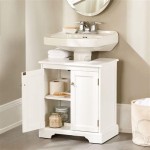Essential Aspects of Bathroom Sink Water Line Size
When it comes to bathroom sinks, water line size is a crucial factor that can impact both functionality and aesthetics. Understanding the appropriate water line size for your sink can help ensure proper water flow, prevent leaks, and maintain the overall performance of your bathroom. This article will delve into the essential aspects of bathroom sink water line size, providing you with the knowledge to make informed decisions for your bathroom renovation or repair project.
Determining Water Line Size
The size of a water line is typically measured in inches and refers to the inner diameter of the pipe. For bathroom sinks, the most common water line sizes are 1/2 inch and 3/8 inch. The size you choose will depend on the type of sink and faucet you have. A larger sink with a higher flow rate will require a larger water line to ensure adequate water supply.
For standard bathroom sinks, a 1/2 inch water line is typically sufficient. This size can accommodate most bathroom faucets and provide a good flow rate. However, if you have a vessel sink or a high-flow faucet, a 3/8 inch water line may be necessary to prevent water splashing and ensure adequate supply.
Impact on Water Flow and Pressure
The water line size directly influences the flow rate and pressure of the water coming out of your bathroom sink faucet. A larger water line allows for a greater volume of water to flow through, resulting in a higher flow rate. This is particularly important for sinks that require a strong water stream, such as those used for rinsing dishes or washing hands quickly.
Conversely, a smaller water line can restrict the flow of water, leading to a lower flow rate. This may be suitable for sinks that do not require a high flow rate, such as those used for washing hands or brushing teeth. However, a water line that is too small can also cause low water pressure, making it difficult to perform certain tasks effectively.
Avoiding Leaks and Damage
Properly sizing the water line for your bathroom sink is essential to prevent leaks and water damage. A water line that is too large can put excessive stress on the connections and fittings, leading to leaks. Similarly, a water line that is too small can restrict the flow of water and cause pressure buildup, potentially damaging the sink or faucet.
By selecting the appropriate water line size and ensuring secure connections, you can minimize the risk of leaks and protect your bathroom from costly water damage.
Material and Durability
In addition to size, the material of the water line also plays a role in its durability and performance. Copper is a popular choice for water lines due to its resistance to corrosion, rust, and chlorine. PEX (cross-linked polyethylene) is another common material that offers flexibility and resistance to freezing. Galvanized steel is less durable but is often used in older homes.
When choosing a water line material, consider the type of water supply in your area, the age and condition of your plumbing system, and the budget available.
Professional Installation
For optimal performance and safety, it is highly recommended to have a qualified plumber install your bathroom sink water line. A professional plumber can determine the correct water line size, select the appropriate material, and ensure secure and leak-free connections. Attempting to install a water line yourself can increase the risk of leaks, damage, and potential injury.

What Size Are Faucet Supply Lines For All Faucets Tck

What Size Are Faucet Supply Lines For All Faucets Tck

What Size Are Faucet Supply Lines For All Faucets Tck

What Size Pipe For Sink Drain Choosing Tips

Domestic Water Piping Design Guide How To Size And Select

What Size Pipe For Sink Drain Choosing Tips

Residential Pipe Sizing Chart Guide American Home Water Air

Have The Correct Water Supply Line Size 3 Factors

Bathroom Plumbing Rough In Dimensions The Home Depot

Pipes And Home Plumbing For Diy Plumbers







